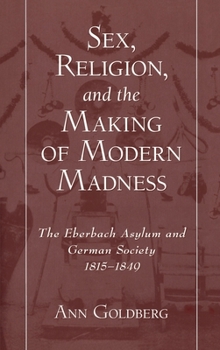Sex, Religion, and the Making of Modern Madness: The Eberbach Asylum and Germany Society, 1815-1849
Select Format
Select Condition 
Book Overview
Drawing upon a rich set of asylum patient case records, this book reconstructs the encounter of state officials and medical practitioners with peasant madness and deviancy at a transitional period in German and psychiatry history. Focusing on religious madness, nymphomania, masturbatory insanity, and Jewishness, this study probes the daily encounters in which psychiatric categories were applied, experienced, and resisted in the settings of family, village, and insane asylum. Goldberg's careful examination sheds light on a range of issues concerning gender, sexuality, religious politics, class relations, state-building, and anti-Semitism.
Format:Hardcover
Language:English
ISBN:0195125819
ISBN13:9780195125818
Release Date:June 1999
Publisher:Oxford University Press
Length:256 Pages
Weight:1.25 lbs.
Dimensions:1.0" x 6.4" x 9.6"
Customer Reviews
1 rating
they must have taken my marbles away
Published by Thriftbooks.com User , 20 years ago
I highly recommend this book for a number of reasons. First, it is very phenomenologically sensitive to, as can be gathered from documentation, the experience of those being 'treated' for 'mental illness'. Second, it shows quite convincingly that the behavior and experience that is called insane is a socially intelligible reaction to social situations. Third, it does the above without, as far as I can detect, trying to force the scene into a pre-set theoritical mold. This point deserves emphasis. Too often social histories of insanity, however sensitive to institutionalization and social construction, tend to be more concerned with the big picture, whereas this book limits itself more severely than others, and seems more sensitive to the people as people, and not as just 'social constructions'. Moreover, the 'angle' from which she sees insanity is constantly shifting to allow the voices to speak for themselves. What i got out of this book is that a great deal of the trouble then, and indeed now I must say, is that those in power to decide who is mad and how to treat the mad, are rather routinely, and institutiionally, whole insensitive to the experience of madness from a first-person point of view, and that this state of affairs produces not so much a distortion as an existential shockwave of misunderstanding, suffering, and hell on earth with the best of intentions. The beauty of this book is to be found in the diversity of scope, perspective (gender, class, doctor, patient, poor, rich, religious, scientific, family, interpersonal, asylum, sex, micro and macro, politics, laws, and on and on) and detail with which she draws out the above. A welcome edition to the works of the likes of R.D. Laing, Goffman, jules henry, paul goodman, and others who point out that seemingly irrational and insane actions become perfectly intelligible as ordinary human reactions to barbaric interpersonal non-interactions in barbaric institutions. I recommend this over Foucault, as this is more accessible in virtue of being more personal, human, direct, and micro-historically sensitive. Goldberg brings the people to life, a trait of writing noticably missing from a lot of philosophy, and the pseudo-scienctific garbage of psychology and psychiatry.





